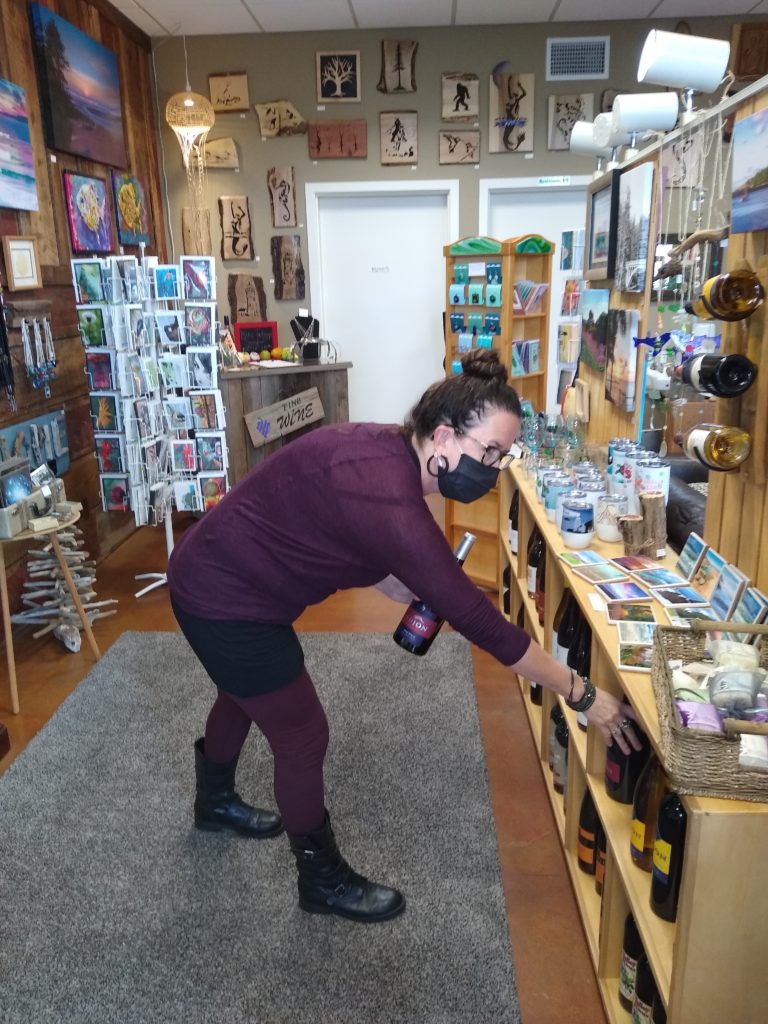
By CHERYL ROMANO/YachatsNews.com
Despite early fears, COVID-19 did not crush tourism on the central Oregon coast this summer and fall.
In fact, from summer through early autumn, many businesses in Yachats and the central coast experienced strong — and in some cases record-setting — sales.
But going into the traditionally slow winter season, the forecast is one big question mark.
“Business was up this summer against all odds,” said Dave Price, director of small business development at Oregon Coast Community College. “People who normally go to Europe or the Caribbean came here instead” due to travel restrictions and coronavirus cautions.
That influx of visitors turned a foggy summer to a fairly bright season that extended into the fall for many Yachats retail shops and the hospitality sector.
“Best summer I’ve had in my 12 years of operation,” said Robert Anthony, owner of Luna Sea Fish House.
“We doubled our sales from October of last year,” said Kim McLaughlin of The Laughing Crab Gallery.
“We had a better than normal season, based on pent-up consumer demand,” said Jamie Michel, vice president of business development at Sweet Homes Vacation Getaways.
“It was the best October in the 18 years I’ve been open,” attested Judith MacDonald of Judith’s Kitchen Tools.
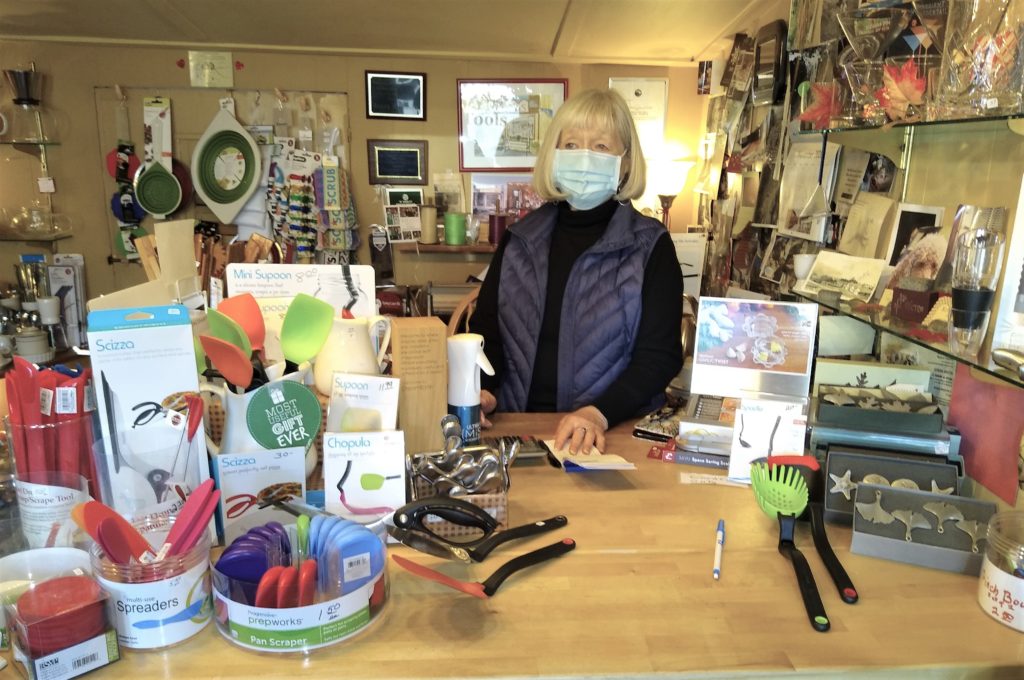
November’s big change
But November brought a big chill.
Soaring coronavirus cases spurred Gov. Kate Brown to order a “freeze” from Nov. 18 to Dec. 2 that restricted restaurants, bars and lodging, and limited retail spaces to 75 percent of occupancy.
“Business just took a dive,” said MacDonald.
Limited to take-out food only, restaurants took a hit: Leroy’s Blue Whale temporarily closed; the Sea Note Lounge shut down after offering take-out only for a few days with a skeleton crew; Ona Restaurant tried one Saturday take-out event, then cancelled the second, before reopening Thursday at the new state rule of 25 percent capacity.
Worsened by some windy, stormy November weather, the governor’s “freeze” also forced motels and short-term rentals to limit spaces to six people from two households.
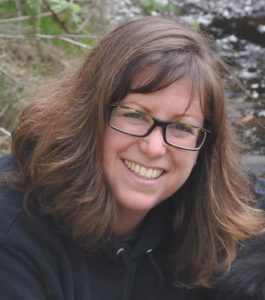
“The phone started ringing with cancellations” for Thanksgiving and Christmas, said Michel, whose firm manages some 70 short-term rentals from Yachats to Lincoln City.
Having laid off most of their 45-person staff during the spring shutdown, Sweet Homes was able to re-hire many as the summer season rebounded.
Now?
“There’s a lot of uncertainty; we take it one day at a time,” Michel said.
From her position as a committee chairwoman in the Oregon Restaurant & Lodging Association, Michel has seen how inter-dependent tourism businesses are on the central coast.
“The restaurant owners have said, ‘If they shut you (vacation rentals) down, I may as well shut down, too,’ and it works the other way as well — if the Oregon Coast Aquarium and restaurants aren’t open, then we lose business, too.”
While many business owners predicted the freeze would extend through the Christmas and New Year holidays, the governor last week announced a partial loosening of restrictions effective Thursday, at least for Lincoln County.
Will it help? No one knows.
“We don’t know what to expect”
“What I’m hearing from business owners is, ‘We don’t know what to expect,’” said James Kerti, director of the Yachats Visitors Center. “When everything first closed down in the spring, most businesses had expectations of opening up again in the summer. As time went on, we thought we were going to get more open, not less open.”
That uncertainty makes it tough to plan inventory and staffing for any business that relies on tourism. In mid-November, the Yachats City Council learned that the income from food, beverage and transient lodging taxes was much better than expected for July, August and September.
The expectation, though, was based on a projection of bringing in 50 percent less than the usual $1.5 million a year. And the numbers don’t necessarily signal healthy profits for the restaurants and lodging enterprises paying the tax.

“The overall revenue numbers don’t necessarily reflect the difficulties of the pandemic,” observed Kerti. “Maintaining and stocking inventory, start-and-stop openings, managing staff … that all affects profits. Plus, having to pay rent and other fixed expenses when you’re closed. To the extent we can find creative solutions to get through this winter together, that’s great.”
As the pandemic drags on, business owners everywhere have struggled. Many were forced to lay off employees, scale down their offerings and, in the case of restaurants, their seating capacity. Retail shops also had customer limits, switched to “by appointment only” and offered curbside pick-up.
Following coronavirus safety protocols adds to the cost of doing business: sanitizing stations, take-out packaging materials and Plexiglas shields aren’t free.
“There’s a litany of new costs just to open the doors,” said Price. In the wake of the November freeze, “Volume and revenue are down and costs are up.”
The cost of an air purifier seemed like a great idea for MacDonald’s kitchen shop, but that was weeks ago. With a small shop at just 131 square feet, she invested in a high-end air purifier that she snagged on sale for $409.
“I feel I have to have it now, for my own safety and that of my customers” to get air circulating with the front door and back window closed. “October was so good, I thought sure, I can do this, but now, I might have to try the Presbyterian church fund to pay it off.”
The fund from the Yachats Community Presbyterian Church ran for several months after last spring’s shutdown, aiding laid-off workers and struggling businesses. Re-ignited last month by an anonymous $50,000 donation, the fund offers cash to individuals and enterprises hurt by coronavirus restrictions.
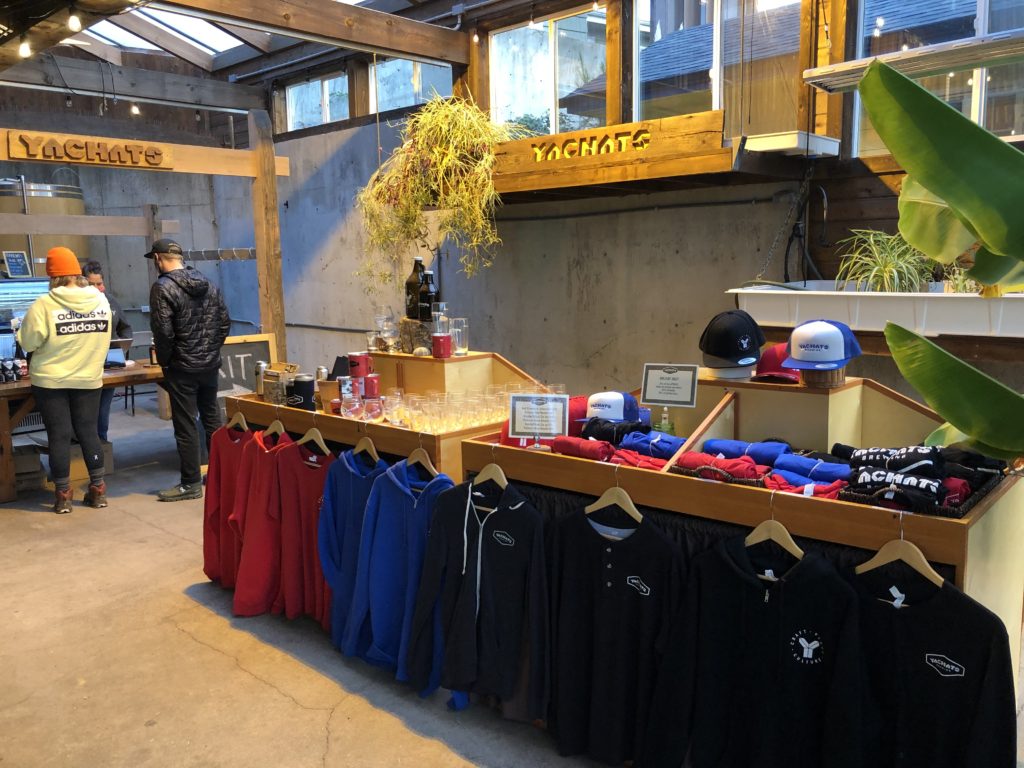
Creatively fighting the virus slump
A couple of local merchants are fighting back against ailing business with creative adaptations. Two of the more notable are Yachats Brewing + Farmstore, and The Laughing Crab Gallery.

“I’m building adaptability and resilience into the business,” said owner Nathan Bernard of his restaurant and brewery. “Although we operate largely as a restaurant, we are still very much a commercial kitchen and processing facility.”
Bernard has shifted the beer business to selling craft brews in four-packs of 16-ounce cans, and hired a salesman to help move product around the state; “We’re totally self-distributed.” That shift came early in the year, and coincided well with a drop in keg sales. “When restaurants and bars close, they don’t buy kegs,” he said.
Forced to lay off 10 employees after last month’s freeze, Bernard has been “pleasantly surprised at the amount of to-go business that we’re doing.” He and his core staff have been focusing on “using what we have and what we can buy in the immediate area,” with almost all their purchasing done direct-from-farmers and fishermen.
When the November freeze shut down in-person dining, general manager Jennifer Fredericksen spearheaded transforming what had been a greenhouse dining area into an open-air market.
Customers are invited to “mask up and walk on through” the facility’s blue doors, pick up a sanitized menu and place their orders. Then, they can choose from store-branded merchandise, books, glassware and more.
“When we first opened as a farm store seven years ago, we had a lot of locally-produced items we sold as a market; it’s really nice to see those come back,” Bernard said.
The brewery and store will close for its traditional winter break from Dec. 21 through Feb. 10
Just steps away at The Laughing Crab, wine tastings and sales were launched in October by co-owners Kim McLaughlin and husband Gary Manos. “The summer went pretty well and slowly improved” in sales of the works by some 50 artists, almost all Oregon residents, said McLaughlin.
“We started wine tastings in October, and that was a really great month for us — the wine was a key component,” she said.
The state license and the wine inventory start-up cost more than one month’s rent. But happily, McLaughlin and Manos found that “The wine and the art really go well together. People are looking for more creative, fun environments to experience here in Yachats.”
The gallery owners set up red Adirondack chairs on their front patio, and invited customers to enjoy that space, or take advantage of private art-plus-wine rooms in the back of the gallery. However, wintry weather and the governor’s “freeze” had November “not looking so great.”
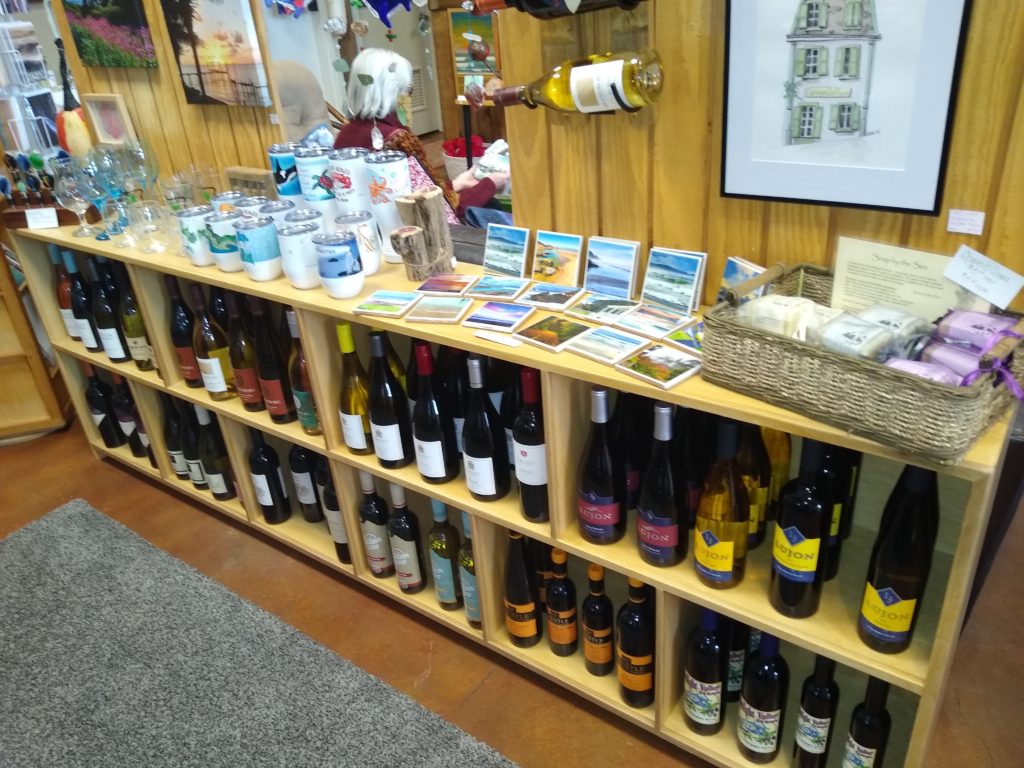
At stake: business survival
While the freeze put the cork on in-store wine tastings, the gallery is still able to sell bottled wine. Like most retailers, though, McLaughlin worries about the winter season.
“We are going to be struggling if this shutdown continues,” she predicted.
Although the owners have no additional employees, McLaughlin stressed that “A gallery like ours supports so many artists. Some are retired, but we have quite a few that have to work other jobs.”
One in particular, whose works are exhibited at The Laughing Crab, was homeless for a while. He acquired a home, but then lost everything in Oregon’s September wildfires.
McLaughlin is urging locals and tourists to buy gift certificates, echoing the call from many local retailers and restaurants.
“It’s as easy as shopping on Amazon to shop online with local stores,” McLaughlin said. “Our economy depends on all of us; everything is connected.”
For his part, Bernard is hopeful that when his brewery/restaurant re-opens in mid-February, “It will feel like a new day is dawning … so that we can re-open with our best foot forward and our strongest chance of surviving as a business. Survival is a hard thing to think about, but that’s really the stakes here.”
- Cheryl Romano is a Yachats freelance reporter who contributes regularly to YachatsNews.com. She can be reached at Wordsell@gmail.com



Excellent article. One can only hope for better days for Yachats and for us all.